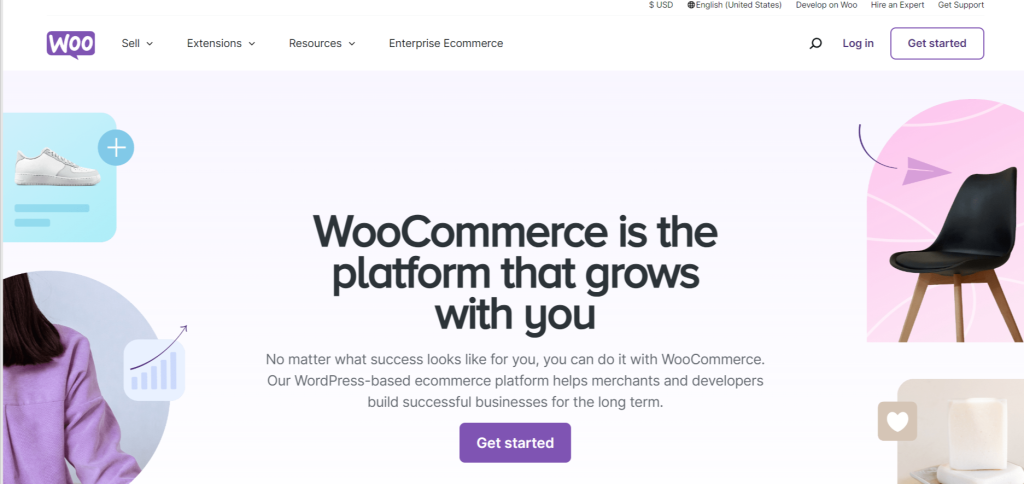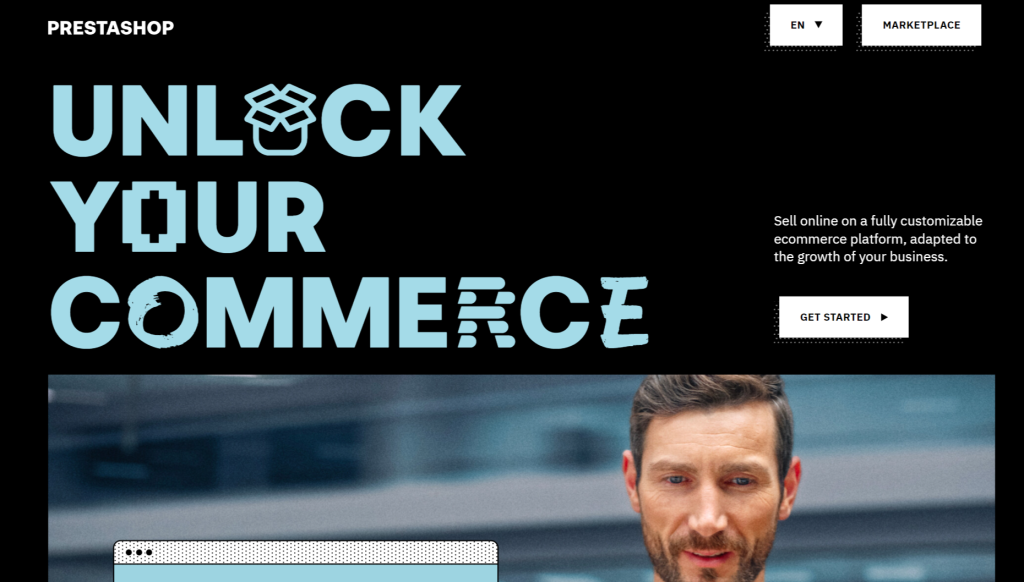Choosing the right e-commerce platform can make or destroy your web business. Shopify is one of the leading e-commerce platforms famous for its simplicity. Easy to use, customizable templates, and complete-featured options like payment gateways and stock management.
It accommodates all business types from retail businesses, subscription businesses, dropshipping businesses, to digital product sellers. Shopify is not the best choice for all businesses due to its pricing plan.
Thus, we will discuss the Best Shopify Alternatives available. We’ll pit these alternatives against each other on features, ease of use, cost, scalability, and support and assist you in selecting the best platform for your requirements and budget.
Key Takeaways
Below are 7 key takeaways from the eCommerce platforms you listed:
- Varied Set of Solutions: The list reflects a varied set of eCommerce platforms, and therefore one solution is not present. Organizations have the choices of utilizing open-source, SaaS (Software as a Service), and hosted solutions based on their requirements.
- Open-Source Giants: The availability of WooCommerce, Magento, and PrestaShop indicates how flexible and open these open-source options are. They give high flexibility and ownership along with great developer base support but typically require more technical know-how.
- SaaS Simplicity: BigCommerce, Wix eCommerce, Squarespace, and Weebly are the SaaS style, with emphasis on simplicity, hosted management, and occasionally drag-and-drop builders. These are ideal for those who crave simplicity and quicker setup.
- Scalability Options: The platforms support different business scale. Magento is famous for enterprise solutions, while Wix, Squarespace, and Weebly support small and medium-sized businesses or startup new companies. WooCommerce may become very large with proper hosting and coding.
- Differing Technical Requirements: The list is correct in distinguishing between sites with higher technical requirements (Magento, self-hosted WooCommerce, PrestaShop) and those for individuals with lower technical skills (Wix eCommerce, Squarespace, Weebly).
- Target Target Niches/User Segments: While they are all eCommerce websites, each has a fairly unique user set. Wix and Squarespace, for example, are roundly praised for good website building combined with eCommerce, for users needing an end-to-end solution for content and selling.
- Ecosystem and Integrations: Each platform has its own collection of themes, plugins, and integrations. WooCommerce, being a WordPress-based solution, leverages the massive WordPress plugin ecosystem. Magento boasts a robust marketplace as well.
Why You Need a Shopify Alternative
Where Shopify is great with regards to ease and large app store, it may not be ideal for every company. Typical reasons for seeking Shopify competitors include:
- Cost: Shopify’s monthly subscription charges, coupled with transactional fees (should non-Shopify Payments be utilized), can quickly add up, particularly for companies that offer low-margin goods or high-volume sales.
- Customization Limitations: Though Shopify does have themes and apps, we need to write our own code or pay for the use of third-party solutions in order to do deep-level customization, and that takes away from one-to-one branding.
- Control and Ownership: Shopify is a hosted solution, so you don’t own the underlying codebase and infrastructure in full, and that can be a limitation for some businesses.
- Specific Features: Certain niches or business models might require specific features built into them that are readily accessible or cheaper on other platforms.
WooCommerce

WooCommerce is a popular e-commerce plugin that integrates with WordPress using a managed WordPress hosting plan, providing a robust platform for creating and managing online stores. Here’s a detailed look at its features, benefits, and considerations:
As a WordPress plugin, WooCommerce benefits from the vast ecosystem of WordPress themes and plugins. Installation is straightforward, and once activated, it integrates smoothly with existing WordPress sites. This setup allows users to manage their online store alongside their blog or other website content, all from a single dashboard.
Key Features
- Customizable Product Pages: WooCommerce provides extensive customization options for product listings, including variable products, downloadable goods, and subscriptions. You can set up different product types and offer a range of attributes and variations.
- Payment Gateways: It supports a variety of payment methods, including PayPal, Stripe, and direct bank transfers. Additional payment gateways can be integrated through plugins.
- Inventory Management: Users can manage stock levels, track product availability, and set up alerts for low inventory. This feature helps keep operations smooth and ensures that products are always available for customers.
- Shipping Options: WooCommerce offers flexible shipping settings, including flat rate, free shipping, and real-time calculations based on customer location and order weight.
- Tax Management: The plugin helps in configuring tax rates based on location, ensuring compliance with tax regulations.
- Extensive Plugin Ecosystem: WooCommerce’s ecosystem includes WordPress plugins for SEO, marketing, analytics, and more. This allows users to extend their store’s functionality as needed.
Pros
- Flexibility and Customization: WooCommerce provides a high level of flexibility in customizing your online store. You can modify the design, functionality, and user experience to suit your specific needs.
- Large Plugin Ecosystem: With thousands of plugins available, WooCommerce users can enhance their store’s functionality with features like advanced analytics, improved SEO, and additional payment gateways.
- Cost-Effectiveness: WooCommerce itself is a free plugin, which makes it an affordable option for businesses looking to start an online store.
Cons
- Requires WordPress Knowledge: Since WooCommerce is a WordPress plugin, users need a basic understanding of WordPress to manage their store effectively.
- Potential for Higher Maintenance: Managing a WooCommerce store involves maintaining both the WordPress core and the WooCommerce plugin, along with any additional plugins or themes.
Ideal For
The choice between WooCommerce and Shopify can be tricky. However, WooCommerce is an excellent Shopify alternative. It is particularly well-suited for small to medium-sized businesses that already use WordPress or are comfortable working with it. It is also a great choice for businesses looking for a cost-effective, customizable e-commerce solution that can grow with their needs. Its flexibility and extensive plugin ecosystem make it a versatile option for a wide range of online retail scenarios.
Choose the Best Shopify Alternative for Your Business
Whether you’re looking for customization, ease of use, or affordability, there’s a solution out there for you. Ready to take the next step? Discover how WooCommerce can power your online store with reliable hosting solutions from Ultahost.
BigCommerce

BigCommerce is a robust e-commerce platform designed to support businesses of various sizes with a focus on scalability and built-in features. It provides a comprehensive suite of tools to help you create and manage a successful online store, making it a strong Shopify Alternative.
BigCommerce is known for its powerful and scalable e-commerce solutions, catering to both small businesses and large enterprises. It offers a range of features that support growth and efficiency, allowing businesses to handle high traffic volumes and large product catalogs with ease.
Key Features and Unique Selling Points
- Built-in Features for Scalability: BigCommerce is designed to grow with your business. It includes advanced features like multi-channel selling, product variants, and inventory management. The platform supports high transaction volumes and can handle large catalogs, making it suitable for businesses expecting significant growth.
- No Transaction Fees: Unlike some other alternatives to Shopify, BigCommerce does not charge transaction fees, which means you keep more of your revenue. This is particularly beneficial for businesses with high sales volumes or those using third-party payment gateways.
- Comprehensive SEO Tools: BigCommerce offers a range of SEO tools to help improve your store’s search engine rankings. Features include customizable URLs, meta descriptions, and a built-in blog. Additionally, the platform provides detailed analytics to track SEO performance and optimize content accordingly.
Pros
- Built-in Features for Scalability: BigCommerce includes a range of built-in features that support business growth without needing extensive third-party apps. This includes tools for advanced shipping options, product management, and customer segmentation, which are essential for scaling operations effectively.
- No Transaction Fees: BigCommerce’s lack of transaction fees allows you to maximize your profits. You can use third-party payment gateways without incurring additional charges, which can be advantageous for businesses with high transaction volumes.
- Comprehensive SEO Tools: The platform’s SEO capabilities are robust, offering a variety of tools to enhance your online visibility. From customizable meta tags to detailed SEO reporting, BigCommerce helps you optimize your store’s search engine performance.
Cons
- Higher Starting Cost: BigCommerce’s pricing can be higher compared to some other Shopify alternatives, particularly at the entry level. The cost of plans may be a consideration for smaller businesses or startups with limited budgets.
- Learning Curve for Advanced Features: While BigCommerce is powerful, its range of features can come with a learning curve. Some of the more advanced functionalities may require additional time and effort to master, which can be a challenge for users who are new to the platform or e-commerce in general.
Ideal For
BigCommerce is particularly well-suited for growing businesses that need a scalable e-commerce solution with extensive built-in features. It is an excellent choice for companies using WordPress Secure Hosting plan and looking for a robust platform capable of handling complex product catalogs, high traffic volumes, and multi-channel sales. Its advanced tools and lack of transaction fees make it a strong candidate for businesses focused on long-term growth and efficiency.
Magento

Magento is a powerful e-commerce platform known for its flexibility and scalability, making it suitable for businesses of various sizes. It offers both an open-source version and a cloud-based solution, catering to different needs and budgets.
Magento is renowned for its comprehensive e-commerce capabilities and customization options. The platform provides a high degree of flexibility, allowing businesses to create tailored online stores that meet their specific needs. Magento is available in two main versions: Magento Open Source and Magento Commerce Cloud.
Open-source vs. Commerce Cloud Versions
Magento Open Source: This version is free to use and provides a robust set of e-commerce features suitable for small to medium-sized businesses. It allows for extensive customization and flexibility but requires users to handle their own hosting services, maintenance, and security.
Magento Commerce Cloud: This is a paid version offering additional features, cloud hosting, and enhanced support. It includes advanced functionalities like personalized content, advanced marketing tools, and greater scalability, making it an ideal Shopify alternative for larger enterprises with complex needs.
Key Features
- Highly Customizable: Magento stands out for its high level of customization. Users can modify almost every aspect of their store, from design to functionality. This flexibility is supported by a wide range of extensions and themes available through Magento’s marketplace.
- Strong Community Support: Magento benefits from a large and active community of developers and users. This community contributes to a rich ecosystem of extensions, themes, and resources, as well as providing support through forums, documentation, and events.
- Advanced Features for Large Stores: Magento’s Commerce Cloud version offers advanced features like multi-store support, advanced reporting, and sophisticated inventory management. These tools are designed to handle the needs of large enterprises and businesses with complex e-commerce operations.
Pros
- Highly Customizable: Magento’s flexibility allows businesses to create highly tailored e-commerce experiences. Whether you need unique product pages, custom checkout processes, or specific integrations, Magento can accommodate these requirements through its extensive customization options.
- Strong Community Support: The Magento community is a valuable resource for users, providing support, development resources, and a marketplace of extensions. This robust community ensures that users have access to a wealth of knowledge and tools to enhance their e-commerce operations.
- Advanced Features for Large Stores: Magento’s advanced features are well-suited for businesses with extensive product catalogs and complex sales processes. The platform’s scalability and sophisticated tools support high traffic volumes and large inventories, making it a powerful Shopify alternative for large enterprises.
Cons
- Complexity and Steep Learning Curve: Magento’s extensive customization options and features come with a learning curve. The platform can be complex to set up and manage, particularly for users without technical expertise.
- Potential High Cost for Commerce Cloud Version: The Magento Commerce Cloud version, while offering advanced features and cloud hosting, comes with a significant price tag.
Ideal For
Magento is ideal for large enterprises and businesses with complex e-commerce requirements. Its advanced features and high level of customization make it suitable for organizations that need a powerful, scalable solution capable of handling intricate operations and large product catalogs. For businesses willing to invest in the resources required to manage and customize the platform, Magento offers a highly flexible and feature-rich e-commerce solution.
Wix eCommerce

Wix eCommerce is an accessible and user-friendly platform that integrates seamlessly with the Wix website builder, offering a streamlined solution for creating and managing online stores.
It is part of the Wix website builder suite, which allows users to design and build websites using a drag-and-drop interface. This integration provides a straightforward way to add e-commerce functionality to a Wix site, making it easy for users to start selling products online.
Integration with Wix Website Builder
Wix eCommerce leverages the Wix website builder’s intuitive design tools, enabling users to create and customize their online stores without needing advanced technical skills. The platform provides a variety of templates and a drag-and-drop editor that simplifies the process of designing both the store and the overall website.
Key Features
- Product Management: It allows users to manage their product catalog, including setting up product variants, tracking inventory, and handling digital downloads.
- Payment Options: The platform supports various payment methods, including credit cards, PayPal, and Wix Payments, which provides a seamless checkout experience for customers.
- Shipping and Tax Settings: Users can configure shipping options and tax rates according to their business needs, including setting up flat rate shipping, regional shipping rules, and automatic tax calculations.
- Built-in Marketing Tools: Wix eCommerce includes tools for email marketing and social media marketing, helping users to market their store and drive sales.
- Design Flexibility: Wix provides a range of design options, including customizable templates and a drag-and-drop editor, allowing users to create a visually appealing online store without needing coding skills.
Pros
- Easy to Use and Set Up: It is designed with simplicity in mind. The drag-and-drop interface and pre-designed templates make it easy for users to set up and manage their online stores, even with minimal technical expertise.
- Affordable Pricing: Wix offers competitive pricing plans, which include e-commerce features at a lower cost compared to some other platforms. This makes it an attractive option for small businesses and startups with budget constraints.
- Built-in Website Design Options: The integration with Wix’s website builder means users benefit from a comprehensive set of design tools. This allows for cohesive branding and a unified look across both the store and the website.
Cons
- Limited Scalability: It may not be suitable for larger businesses or those expecting rapid growth. Its scalability is limited compared to more robust platforms, which might restrict functionality as businesses expand.
- Less Flexibility Compared to Other Platforms: While Wix offers ease of use, it may lack the advanced customization and flexibility provided by other eCommerce platforms like WooCommerce or PrestaShop. This can be a drawback for businesses with complex needs or those requiring highly specialized features.
Ideal For
Wix eCommerce is ideal for small businesses and startups looking for an all-in-one solution that combines ease of use with affordability. It is a well-suited Shopify alternative for users who want a simple, integrated platform to quickly set up and manage their online store without the need for advanced technical skills or extensive customization.
Find the Perfect Shopify Alternative Today!
Don’t settle for less when you can have the best e-commerce platform tailored to your needs. Explore reliable and affordable hosting solutions to power your online store. Ready to make the switch? Discover top e-commerce hosting options with Ultahost.
Squarespace

Squarespace is a popular website builder that also offers e-commerce functionality, making it a strong contender for businesses looking to create visually stunning online stores with ease.
It is known for its sleek, design-focused approach to website building. It provides a platform where users can create visually appealing websites and seamlessly integrate e-commerce features. Squarespace’s focus on aesthetics and simplicity makes it a compelling choice for businesses that value design as much as functionality.
E-Commerce Features
Squarespace offers a range of e-commerce tools that are integrated into its website builder. These tools enable users to set up and manage an online store with ease, though they are often seen as less comprehensive compared to specialized e-commerce platforms.
Key Features and Design Options
- Beautiful Design Templates: Squarespace is renowned for its high-quality, professionally designed templates. These templates are fully customizable, allowing users to create an attractive and unique online store without needing advanced design skills.
- User-Friendly Interface: The platform’s drag-and-drop interface simplifies the process of building and managing your online store. Users can easily add products, adjust layouts, and configure settings without needing extensive technical knowledge.
- Integrated Marketing Tools: Squarespace includes built-in marketing features such as email campaigns, social media integration, and SEO tools. These tools help users promote their stores and drive traffic, making it easier to connect with customers and grow their business.
Pros
- Beautiful Design Templates: Squarespace’s templates are known for their aesthetic appeal and quality. They provide a professional look and feel that can enhance the overall user experience and help businesses stand out online.
- User-Friendly Interface: The platform is designed for ease of use, with an intuitive interface that makes setting up and managing an online store straightforward. The drag-and-drop editor and pre-designed layouts simplify the process, making it accessible for users without technical expertise.
- Integrated Marketing Tools: Squarespace’s marketing tools are integrated into the platform, allowing users to manage email campaigns, social media accounts, and SEO efforts from a single dashboard. This integration helps streamline marketing activities and supports business growth.
Cons
- Limited E-Commerce Features Compared to Other Platforms: While it offers essential e-commerce functionality, it lacks some of the advanced features available on more specialized platforms. This can be a limitation for businesses with complex needs or those requiring extensive customization.
- Higher Cost for Advanced Features: The cost of Squarespace’s higher-tier plans, which include more advanced e-commerce features, can be relatively high. This may be a consideration for smaller businesses or those with tight budgets.
Ideal For
Squarespace is ideal for creative businesses and users who prioritize design and simplicity. Its beautiful design templates and user-friendly interface make it an excellent choice for those who want a visually appealing online store with straightforward setup and management. It is well-suited for artists, designers, and small businesses that value aesthetics and ease of use but may not require extensive e-commerce capabilities.
PrestaShop

PrestaShop is a robust open-source e-commerce platform known for its flexibility and extensive customization options. It offers a comprehensive solution for businesses looking to create a tailored online store with a high degree of control over their e-commerce operations.
PrestaShop is an open-source e-commerce platform that provides users with the freedom to customize and scale their online stores according to their specific needs. As an open-source solution, it allows for significant flexibility, enabling businesses to modify the source code and integrate various modules and add-ons.
Open-Source Nature and Flexibility
PrestaShop’s open-source nature means that it is freely available and can be modified to suit individual business requirements. Users have access to the platform’s source code, which allows for extensive customization. This flexibility makes it an ideal Shopify alternative for businesses with unique needs or those requiring a high level of control over their e-commerce environment.
Key Features
- Customizable Product Catalog: PrestaShop supports a wide range of product types, including physical, digital, and virtual products. It offers detailed product management features, including product variations, attributes, and inventory tracking.
- Advanced Shipping and Payment Options: The platform provides various shipping methods and payment gateways, allowing businesses to configure shipping rates and accept multiple payment options, including credit cards and PayPal.
- SEO and Marketing Tools: PrestaShop includes built-in SEO tools to help improve search engine rankings. It also offers marketing features such as promotional campaigns, discount codes, and email marketing integrations.
- Multi-Language and Multi-Currency Support: PrestaShop supports multiple languages and currencies. Therefore, making it suitable for businesses that operate internationally or have a diverse customer base.
Pros
- Customizable and Scalable: PrestaShop’s flexibility allows users to tailor their online stores to meet specific business needs. The platform offers scalability to accommodate growing businesses, with numerous modules and add-ons available to extend functionality.
- Strong Community and Support: PrestaShop benefits from a large and active community of developers and users. This community provides a wealth of resources, including forums, documentation, and third-party modules.
- No Licensing Fees: As an open-source platform, PrestaShop does not require licensing fees. Therefore, it can help reduce the overall cost of setting up and maintaining an online store. Users only pay for additional modules, themes, or custom development as needed.
Cons
- Requires Technical Knowledge: Due to its open-source nature and extensive customization options, PrestaShop requires a certain level of technical expertise to set up, manage, and optimize. Businesses without in-house technical resources may need to hire developers or consultants.
- Costs for Add-Ons and Modules: While PrestaShop itself is free, many additional features, modules, and themes are available for purchase. These costs can add up, particularly if businesses require multiple or specialized add-ons.
Ideal For
PrestaShop is ideal for medium to large businesses that need a highly customizable and scalable e-commerce solution. It is a well-suited Shopify alternative for users with technical expertise or access to development resources. PrestaShop is particularly valuable for businesses with complex e-commerce needs or those operating in multiple languages and currencies.
Weebly

Weebly is a straightforward website builder that integrates with Square, providing an easy-to-use platform for creating and managing online stores. Known for its simplicity and affordability, Weebly caters to users who prioritize ease of use and integrated payment solutions.
Weebly offers an intuitive platform for building websites and online stores, with seamless integration into Square’s payment processing system. This integration allows users to manage their online sales and transactions efficiently while benefiting from Weebly’s easy-to-use design tools.
Integration with Square
Weebly’s integration with Square enhances its e-commerce capabilities by providing a unified system for managing payments, inventory, and sales. Square’s payment processing tools integrate directly into Weebly, allowing users to accept payments online and in-person with ease. This integration also enables users to synchronize their online store with Square’s point-of-sale (POS) system, streamlining operations across both online and physical sales channels.
Key Features
- Drag-and-Drop Interface: Weebly’s user-friendly drag-and-drop interface simplifies the process of building and customizing your online store. Users can easily arrange elements, add products, and create pages without needing advanced technical skills.
- Integrated Payment Processing: With Square integration, Weebly users benefit from built-in payment processing. This setup supports various payment methods, including credit cards and digital wallets, and offers seamless checkout experiences for customers.
- Basic E-Commerce Tools: Weebly provides essential e-commerce features such as product management, order tracking, and basic shipping options. It also includes tools for managing inventory and setting up promotional offers.
Pros
- Easy Drag-and-Drop Interface: Weebly’s drag-and-drop editor makes it simple to design and manage an online store. This ease of use is ideal for users who want to set up their store quickly.
- Affordable Pricing: Weebly offers competitive pricing plans, including a free tier with basic features and paid plans with more advanced options. This affordability makes it an attractive Shopify alternative for small businesses and startups with budget constraints.
- Integrated Payment Processing: The built-in integration with Square provides a seamless payment processing experience. Users can manage online transactions and synchronize sales with their POS system, simplifying financial management.
Cons
- Limited E-Commerce Functionality: While Weebly offers essential e-commerce tools, it lacks some of the advanced features. This limitation may be a drawback for businesses with complex e-commerce needs or those requiring extensive customization.
- Less Flexibility for Complex Needs: Weebly’s design and e-commerce options are more limited in contrast to other platforms. Businesses with specific or sophisticated requirements may find Weebly’s capabilities restrictive. It does not offer the same level of flexibility as more advanced solutions.
Ideal For
Weebly is ideal for small businesses and users seeking a simple, cost-effective solution for building an online store. Its easy-to-use interface and integrated payment processing make it well-suited for users who prioritize simplicity. It is a good Shopify alternative for businesses looking to quickly set up an online presence with minimal complexity.
Conclusion
Choosing the right Shopify Alternative is key to your online store’s success. While Shopify is a popular option, alternatives like WooCommerce, BigCommerce, Magento, Squarespace, PrestaShop, and Weebly offer unique features tailored to different needs.
Whether you prioritize scalability or simplicity, understanding the strengths and limitations of each platform will help you make an informed choice. Consider your business size, budget, and requirements to find the best fit for building a successful online presence.
For those looking for enterprise-level hosting, consider exploring Ultahost’s scalable WordPress hosting to ensure your site runs smoothly and efficiently. Ready to elevate your e-commerce experience? Discover Enterprise WordPress Hosting with Ultahost!
FAQ
Why should I consider Shopify alternatives?
Considering Shopify alternatives can help you find a platform that better fits your specific business needs, such as customization options, pricing, scalability, or specific features that Shopify may not offer.
What are some key features to look for in a Shopify alternative?
Look for features such as ease of use, customization options, scalability, integrated payment processing, SEO tools, marketing features, and support for multiple languages and currencies.
Which Shopify alternative is best for small businesses?
Platforms like Wix eCommerce, Squarespace, and Weebly are great for small businesses due to their affordability, ease of use, and integrated design tools.
Are there any free Shopify alternatives?
WooCommerce and PrestaShop are open-source platforms that are free to use. However, you may need to pay for hosting, themes, and additional plugins or modules.
Can I migrate my existing store to a Shopify alternative?
Yes, many platforms offer tools and support for migrating your existing store. It’s important to check the specific migration capabilities and support provided by each platform.








